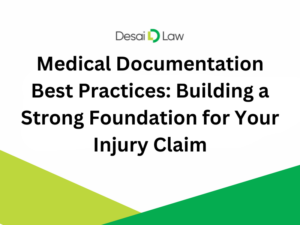There are roughly 1.7 million rear-end accidents in the U.S. each year. Contrary to popular belief, however, not all of these accidents are minor fender-benders. About 1,700 people are killed annually by rear-end accidents, and half a million suffer injuries. If you were injured due to a rear-end accident, a car accident lawyer can seek compensation for your injury.
Common Injuries Resulting from Rear-End Accidents
While whiplash is the most common injury resulting from a rear-end accident, traumatic brain injuries and spinal cord injuries are among the most serious—and they have a high likelihood of resulting in permanent disabilities. Here is a look at four injuries commonly sustained in rear-end accidents.
#1. Whiplash
Whiplash is an injury affecting the soft tissues of the neck after the head snaps back and forth, similar to the motion of a lashing whip. The injury presents with neck pain and stiffness that worsens with movement, headaches that start at the base of the skull, tenderness in the shoulder, upper back, or arms, tingling or numbness, and dizziness.
While many people recover from whiplash through mild medical treatment, rest, and relaxation, some individuals will incur chronic pain due to the injury. The risk of this complication is highest for older people, those who have suffered a whiplash injury before, have existing low back or neck pain, or were injured in a more forceful high-speed accident.
#2. Spinal Cord Injuries
Around 17,000 new spinal cord injuries are diagnosed in the U.S. each year, and car accidents are one of the leading causes of this type of injury. When a rear-end accident occurs, the individual in the lead car often suffers a violent back and forth motion of their body. While this can cause whiplash in the neck, severe impacts can also damage the spinal cord in the neck or back.
The spinal cord is a bundle of nerves that extends from the base of the skull to the waist and serves as a messenger system between the brain and the rest of the body. Spinal cord injuries generally result in a loss of function and sensation beneath the injury site, known as paralysis. A complete injury leaves no remaining sensation or function. However, an incomplete injury can leave some sensation and ability to use the affected parts of the body.
#3. Other Neck and Back Injuries
Rear-end accidents can also result in other types of neck and back injuries, including:
- Lumbar sprains, which can cause pain and instability in the lower back.
- Disc injuries, which involve the jelly-filled discs that cushion the spinal vertebrae. These discs can be knocked out of place or even ruptured in a car accident.
- Vertebral fractures, which damage the small vertebral bones of the spine after high-speed rear-end accidents. If untreated, these fractures can result in pain and instability in the back and can cause damage to the spinal cord, resulting in nerve damage and even paralysis.
#4. Traumatic Brain Injuries
Traumatic brain injuries involve damage to the brain due to a sudden jolt or blow to the body. The jolt experienced in a rear-end accident can result in this type of injury. The brain is responsible for sending impulses to the body to control functions and involuntary responses.
Several functional segments of the brain, known as lobes, control different areas of the body. When damage occurs to any of these lobes, it often results in permanent loss or impairment of the functions that particular lobe controls.
Common types of disabilities due to traumatic brain injuries include:
- The inability to remember people or events.
- Difficulty controlling one’s emotions or impulses.
- Difficulty organizing or completing tasks.
- Inability to move in a balanced or coordinated manner.
- Loss of vision, or the ability to perceive the size and shape of objects.
Rear-End Accidents Can Impact Your Entire Life
Suffering a serious injury, including those listed above, can result in impacts to your entire life, such as:
- Finances: The injuries sustained in rear-end accidents can result in hospitalization or surgical procedures, which can prove expensive. Additional expenses include damage to the vehicle you were riding in, the need for household improvements to accommodate the injury, or hiring someone to perform household tasks such as laundry or cleaning that you are too injured to perform on your own.
- Income: An individual may miss days or even weeks of work or school after a car accident. Catastrophic injuries such as those affecting the brain or spinal cord can result in permanent disabilities that can prevent the sufferer from being able to return to work and earn the same income as before the accident.
- Relationships: Rear-end accidents can produce injuries that cause family members to step into caregiving roles to assist a severely injured loved one. It can also result in the inability to participate in activities and hobbies, leading to the inability to participate in society or enjoy outings with friends.
Individuals who were rear-ended may seek compensation for their injury’s financial and psychological impacts.
Rear-End Accident? A Car Accident Attorney Can Help
Suppose a rear-end accident injured you due to someone else’s negligence. In that case, a car accident lawyer can talk to you about how to seek the most compensation available for your injury.





